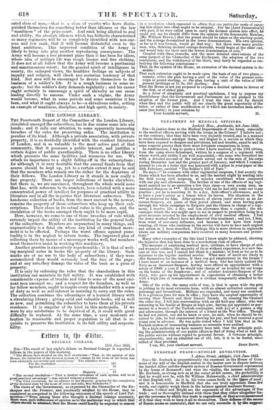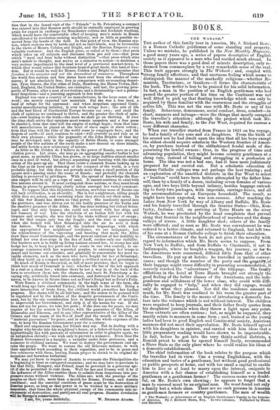.EUROPEAN PEACE — RUSSIAN REVOLUTION.
1-Adam Street, 44104phi, -11th June 1865. Sat-Mr. Roebuck is unquestionably the exponent in the House of Com- mons of the will of the-English nation inthe matter now in dispute between the banded Allies and the despotic system of Russian Government represented tir.thloe2lrueske, oafs strong °nffow; afTici at wtleiree outhtseetvittintier'eathreeerin, intense probability of s that he would now be, with Sir William Molesworth, a chief administrator of that English will. As it is, his voice comes forth in the times of need ; and it is honourable to Sheffield that she can -truly appreciate these few words, and-rightly-weigh them in the balance against mediocre fluency. Messrs. Cobden and 'Bright are the exponents of the advantages of free trade;' and so thoroughly imbued with them that they either altogether for- get the-processes by which free trade is engendered, or they are so enamoured of it that they wish to keep it all to themselves. Their defence of the career of Russia seems so unnatural, that we can only reconcile it by the auppoei- tion that in the famed visit of the " Friends" to St. Petersburg a compact was entered into that Russian serfs should be eternally employed in growing grain for export in exchange for Manchester cottons and Rochdale woollens, which would have the comfortable effect of keeping men's minds in Russia uncultivated by revolution-making machinery, and AB little as possible re- moved from the beasts of the field. In this point of view, the Russian sys- tem, which reckons men by herds and not as individuals, may be favourable to the views of Messrs. Cobden and Bright, and the Russian Emperor a very valuable customer. And the English press, so railed at by them—that press which takes up all subjects and discusses them pro and con—that press which "meal and bran bolts without distinction' —that press which stirs men's minds to thought, and serves as a stimulus to action—is doubtless a very serious impediment to the dead level of a provincial market-town, to which they would reduce this fountain-head of great deeds, this land of free- dom. But it would be well for Messrs. Cobden and Bright to remember that freedom is the ancestor and not the descendant of commerce. Throughout the world free nations and free states have ever been the abodes of com- merce; if not absolutely free, free in comparison with surrounding despot- ism. Tyre, Greece, the free cities of. Italy, Hamburg, the Hanse Towns,i1o1- land, England, the United States, are examples; and last, the growing pros- perity of France, after a nest of revolutions, and a dictatorship—not a perma- nent despotism—and a yearning approach to free trade. England was once a country of no manufactures, in the large sense of the word; she merely exported raw materials. But she was a free land, a land of refuge for the oppressed: and when despotism oppressed Conti- nental manufacturing industry, it ever took refuge here; the arts of life and the best blood of Continental Europe became our own ; and amid the clash of opinions we continued to thrive, and the greater the clash of opin- ion—ever leading to the truth—the more we shall go on thriving. If ever the time shall arrive that opinions must remain unspoken and a free press be shackled, from that time will the empire of serfage begin; from that time will manufactures be placed on the level of slave sugar or slave cotton ; from that time will the &lie of the world cease to congregate here, and the despots of earth—if such continue to exist—will override us and rule us at their own pleasure; while the pugnacity of the John Brights of that day may be developed only in the capacity of Robin Hoods, or some stronger people of the free nations of the earth make a new descent on these islands, and settle herein a new aristocracy of nature.
As little as Mr. Cobden do I believe in the power of Russia, save as a gra- vitation power. Let alone, she may go on aggregating smaller bodies to her great mass, as probably China has grown, or as large bubbles attract smaller ones in a pool of water, but always separating and bursting with the elastic action of the pent-up air. That there exists a clannish Russia looking up to the Czar as its head and dreaming of the conquest of the world, is a very probable thing; but this does not pervade more than a small portion of the square .miles passing under the name of Russia ; and probably the clannish feeling is preserved by privileges. With the spread of knowledge the Rus- sian empire will be only as a rope of sand. It cannot continue to exist with free nations around it. It must extinguish those nations, or they muat break Russia in pieces by generating elastic action amongst her varied communi- ties. To suppose that this disjointed, boneless, nerveless mass of Russia can roll back civilization, is an absurdity. She is but a nightmare, riding people while they are asleep, and vanishing when they stretch out their arms. In all this war Russia has shown no vital power. She insolently moved into the provinces, and was driven out by the bodily presence of the Turks and the shadowy presence of the Allies. She has done nothing but defend Sebas- topol, and that only because she could not retreat with her ships and her treasury of war. Like the chieftain of an Indian hill fort with his treasure and seraglio, she was tied to the stake without power of escape ; and for that reason only has she fought ; and the time is approaching when shi herself will blow Sebastopol into the air to save it from her baitera. When we think of the insolent brigandage with which she appropriated her neighbours' territories, we are indignant; but the remembrance of the vapouring and boasting that made the Allies draw lines round Constantinople, and the present contrast of her inability to defend her own door-steps in the Sea of Azoff, excites only our risibility. Our business now is to build up living nations around her, to cramp her and hedge her in, to keep her ports and her coasts in our own custody, to en- courage commerce with her separated peoples, to encourage her troops to desert and become our colonists', and gradually to concentrate her most va- luable elements, such as the men who have fought for her at Sebastopol, till they build up a compact nation under a civilized system of government.
So much of Russia is theatrical, so full of mere pretence, that we begin to think bow much of Cronstadt is real ; whether the bar of the left approach be a real or a sham bar ; whether there be not a way in at the back of the forts to overthrow them into the channels, and leave St. Petersburg a de- caying city, artificially forced into existence, and destroyed-for lack of com- merce, to be known in future times not as Peter's Burgh but as Peter's Folly.
Were Russia a civilized community in the high sense of the term, she would long ago have absorbed Turkey, with benefit to the world. Being a mere incarnation of brute force, the civilized world proscribes her further progress. Her shams will be all laid bare; and the course to be pursued will be regulated not by the pishes of the despotic governments of the Conti- nent, but by the one consideration how to destroy her powers of mischief, to impoverish her Government, and strip it of the means for war. If she does not sue for peace, we take her ports ; if she does sue for peace, we may require of her the cession to Turkey, with the guarantee of the Allies, of Bessarabia and Khersop, and to any other representative of the Allies of the Crimea and the coasts of the Sea of Azoff and the mouth of the Don, as "material guarantees" for peace, and in addition, the whole expenses of the war, to keep the Russian Government poor- for a century. Hard and ungenerous terms, her friends may say. But in dealing with a burglar who breaks into his neighbour's house, or a ticket-of-leave man who hypocritically lies with pretexts of reformation in order to plunder again, we do notprofess chivalry—we wish only to prevent a nuisance. Even thus the Russian Government is a burglar, a swindler under false pretences, and a nuisance to civilized nations. We want to destroy the government and up- raise the people. We want to restore the old Sclavonic nations, to work their appointed work according to their capacities, and to be in peace and free commerce with them, leaving Russia proper to shrink to its original di- mensions and harmless barbarism.
We may yet have to require of Austria to evacuate the Principalities she is beginning to treat as conquered countries; and we may have to proclaim to her that Italy, Hungary, and Poland, -must be governed in a generous spi- rit if she be permitted to rule them. Well for her and Prussia will it be if the influence of the Allies enables them to subside from despotisms into pro- gressive states without violence. The Allies are, with the prestige of the peoples on their side, more than .a match for Russia, Prussia, and Austria combined ; and the essential condition of peace must be the destruction of Russian power, so long as that power is to be wielded by -a mere military despotism, that fuses the whole physical energy of the community into in- struments of destruction, and paralyzes all real progress. Russian revolution Will be Europe's conservation.



























 Previous page
Previous page